Afghan family seeks ordinary life in Bay Area after fleeing Taliban
Afghan family seeks ordinary life in Bay Area after fleeing Taliban
Afghan family seeks ordinary life in Bay Area after fleeing Taliban. Jesse Gary reports
FREMONT, Calif. - Mohammed Hashim Sajad is looking for a job as an electrical engineer. His wife, Raihana Baqayee, wants to cut hair. The couple is hoping to enroll their two young daughters, Manira and Manija, into school.
These might seem like ordinary pursuits.
But this family of four yearns for the ordinary. That's after they escaped from the Taliban in Afghanistan in late August, and then spent an 80-day journey in Qatar and a processing center in Wisconsin before arriving in Hayward this month as refugees.
"The feeling is very happy. My children are happy. My wife is happy," Sajad said recently, speaking from the offices of the Afghan Coalition in Fremont, a nonprofit agency helping to provide immigrants with legal help, housing, clothing and other social services they will need to adjust to life in the United States. "I thank God when I wake up in the morning."
According to the 2019 Census, roughly 150,000 Afghans live in the United States and the majority of them chose to live in Fremont and the surrounding areas. The rolling hillsides remind Afghans of home, and many already have friends and family here, or at least circles of people who speak Dari and Pashto. Fremont even has a district nicknamed "Little Kabul" reflecting the significant Afghan presence in the Bay Area's fourth-largest city.
Afghans like the Sajid family are now seeking refuge as part of a third modern-day wave of immigration. The first two waves came in the 1980s after the Soviet invasion of Afghanistan, and the second was after 9/11 when the fundamentalist government of the Taliban took over the country after the terrorist attacks on the U.S.
This most recent wave kicked off late this summer after President Joe Biden decided to pull military troops out of Afghanistan because he wanted to end the 20-year war there, which cost American lives and resources.
SEE ALSO: Afghan family who fled Taliban's hail of bullets looks to rebuild lives in Hayward
Finding Refuge: Afghans in the Bay Area
After the U.S. withdrawal from Afghanistan, Afghans fled gunfire and chaos in hopes of escaping the Taliban. Some of them found refuge in the Bay Area.
At the same time, the Biden administration orchestrated an unprecedented evacuation of Afghanistan, airlifting about 120,000 Afghans out of the country as the Taliban government moved in.
And now, those evacuated Afghans are looking to rebuild their lives in the diaspora.
Among their biggest hurdles: Finding housing.
Affording a place to live in the Bay Area for anyone, let alone refugees from a poor country, is among the most difficult tasks.
"There's a saying in Farsi," said Madeena Siddiqui, a volunteer with the Afghan Coalition. "If I cannot help my country, the closest is helping my people. We are that bridge to help families settle and have an easy transition to this new life. Living in the Bay Area is extremely expensive."
She said that the Afghan Coalition is working with city officials to come up with a plan for Afghans to resettle.
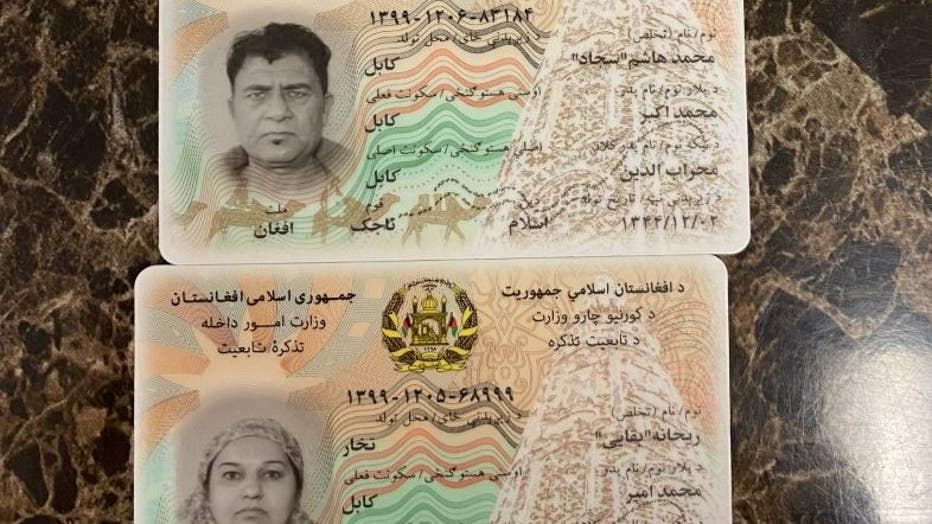
Mohammed Hashim Sajad is looking for a job as an electrical engineer. His wife, Raihana Baqayee, wants to cut hair.
But despite their financial worries, the family can't believe their good fortune in escaping the Taliban, especially because Baqayee's father is a well-known general in the U.S. Army, which puts a target on their backs.
When they fled their homeland, Baqayee described clawing through barbed wire at the Kabul airport, in their hurried escape. Bullets whizzed by their heads. Their skin peeled off, their hands bled.
"As a mother, I had to sacrifice myself and take the pain of my children," she said, speaking through a translator. "I had to swallow it and realize this is temporary pain and we will get through this."
And they did.
The children have already eaten an American breakfast of pancakes and eggs. They have found temporary housing for one month in a Hayward AirBnB. And Sajad already has his H1B visa in hand; he's hoping he can soon land him a good-paying job as an electrical engineer in Silicon Valley. Baqayee is looking for any work; from baby sitting to re-enrolling in beauty school.
While their immediate family is safe, Baqayee said she has relatives still left back in Afghanistan.
And she worries about them.
"I am 80% happy I am here with my husband and kids," she said. "But I'm 20% not satisfied. My parents and siblings are still in danger."
IF YOU'RE INTERESTED: To learn more about the Afghan Coalition, click here.
Lisa Fernandez is a reporter for KTVU. Email Lisa at lisa.fernandez@foxtv.com or call her at 510-874-0139. Or follow her on Twitter @ljfernandez
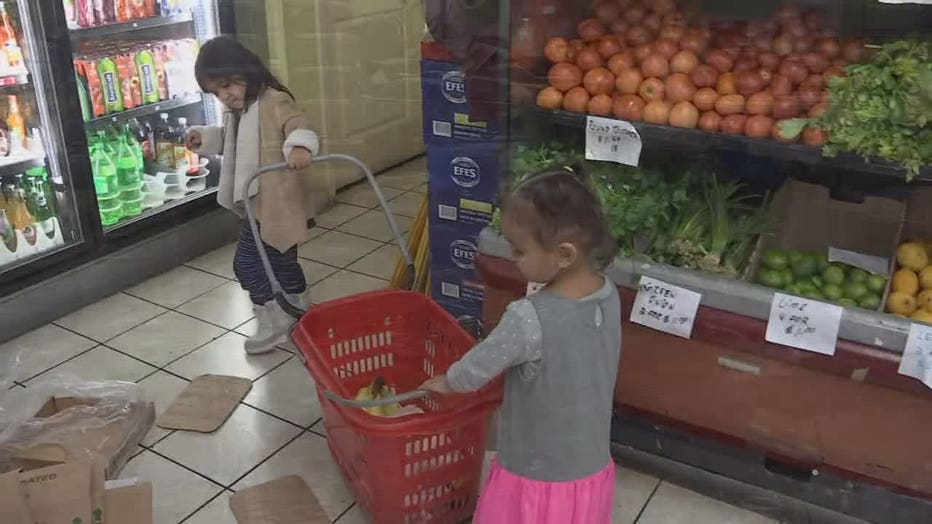
Monira and Monija shop at Zam Zam market in Fremont after arriving from Afghanistan in November.
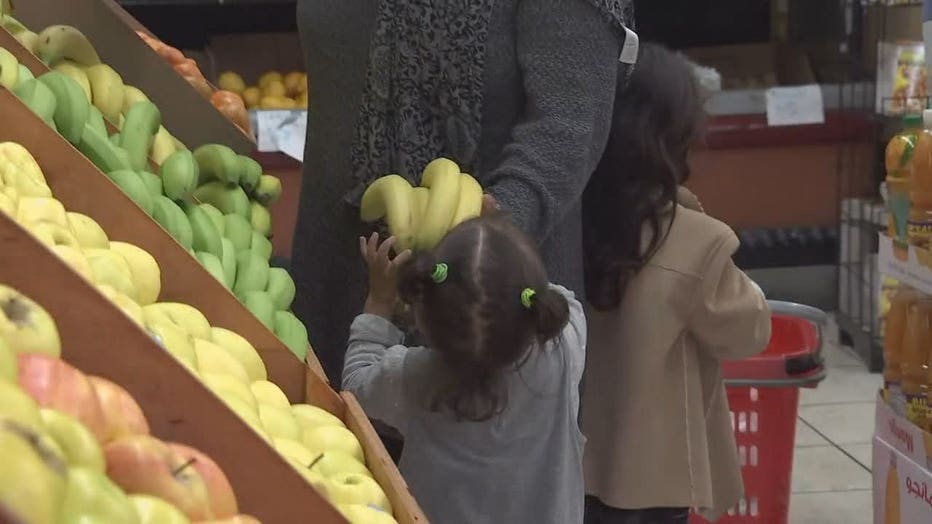
Shopping for bananas at Zam Zam Market in Fremont.
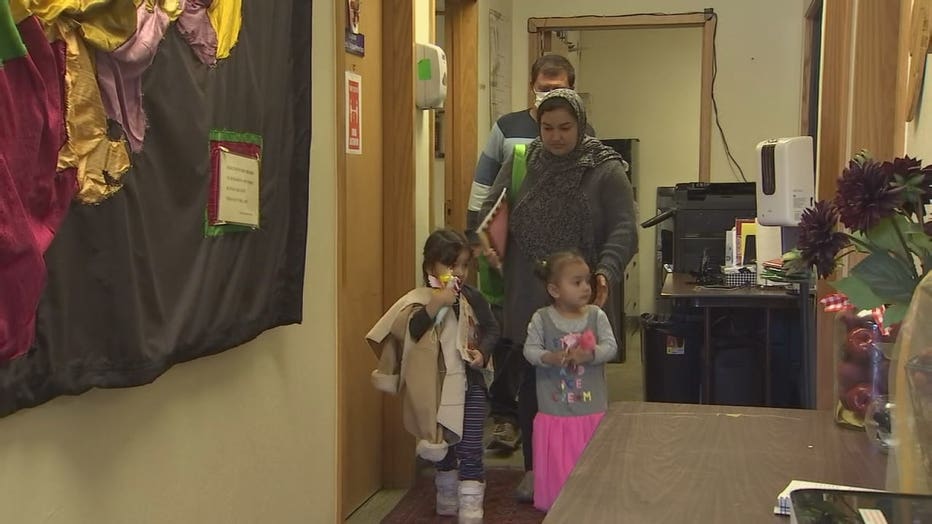
Raihana Baqayee walks with her daughters at the Afghan Coalition in Fremont.
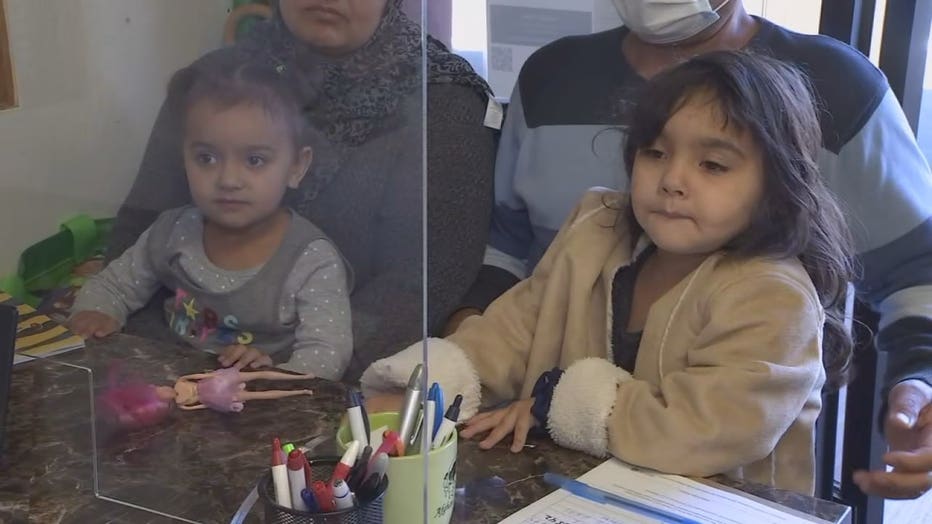
Manira and Manija sit on their parents' laps at the Afghan Coalition in Fremont.

